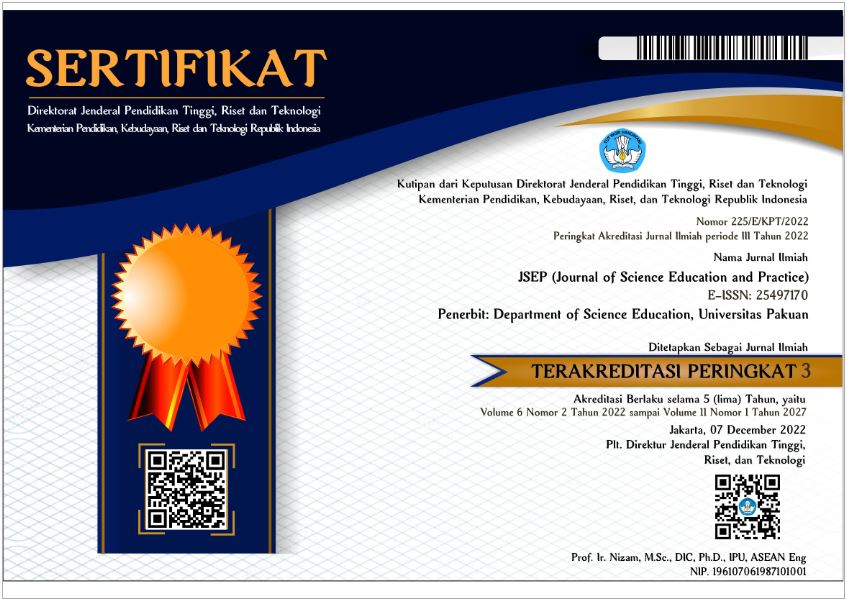ADDITIONAL MENU
Improving Science Learning Outcomes in Water Clearance Material with Science, Technology, Engineering, and Mathematics (Stem) Approaches
Abstract
Keywords
References
Astri, H., Sinurat, Y., & Muhammad, D. (2022). The Implementation of Integrated Project-Based Learning Science Technology Engineering Mathematics on Creative Thinking Skills and Student Cognitive Learning Outcomes in Dynamic Fluid. Jurnal Penelitian Dan Pengembangan Pendidikan Fisika, 8(1), 8394.
Bechter, B. E., Dimmock, J. A., & Jackson, B. (2019). A cluster-randomized controlled trial to improve student experiences in physical education: Results of a student-centered learning intervention with high school teachers. Psychology of Sport and Exercise, 45(June), 101553. https://doi.org/10.1016/j.psychsport.2019.101553
Darsani, L. (2019). Penerapan Model Pembelajaran Berbasis Masalah untuk Meningkatkan Hasil Belajar IPA. Jurnal Pedagogi Dan Pembelajaran, 2(3), 377. https://doi.org/10.23887/jp2.v2i3.19293
Harlis, H., & Budiarti, R. S. (2021). Analisis Hambatan Proses Belajar Biologi dan Cara Pemecahannya Dalam Pelaksanaan Pembelajaran Jarak Jauh. Jurnal IPA & Pembelajaran IPA, 5(4), 331339. https://doi.org/10.24815/jipi.v5i4.23281
Hatuti, E. (2019). Penggunaan Media Tiga Dimensi dapat Meningkatkan Hasil Belajar IPA pada Siswa Kelas IVB. Jurnal PGSD, 12(1), 5562.
Herak, R. (2021). Peningkatan Hasil Belajar IPA Peserta Didik Kelas VIII Materi Sistem Ekskresi melalui Pengaruh Model STEM. Jurnal Studi Guru Dan Pembelajaran, 4(1), 127134.
Ismiyanti, N. (2020). Perancangan Pembelajaran IPA Menggunakan Software Videoscribe. VEKTOR: Jurnal Pendidikan IPA, 1(2), 5058. https://doi.org/10.35719/vektor.v1i2.11
Khaerunnisah, K., Vitasari, M., & Suryani, D. I. (2022). Analisis Pembelajaran IPA Berbasis Praktikum di SMP Negeri seKecamatan Pontang Kabupaten Serang. PENDIPA Journal of Science Education, 6(2), 346352. https://doi.org/10.33369/pendipa.6.2.346-352
Kritis, D. A. N. B., & Redhana, I. W. (2013). Model Pembelajaran Berbasis Masalah Untuk. Jurnal Pendidikan Dan Pengajaran, 1(1), 7686.
Maison, M., Haryanto, H., Ernawati, M. D. W., Ningsih, Y., Jannah, N., Puspitasari, T. O., & Putra, D. S. (2020). Comparison of student attitudes towards natural sciences. International Journal of Evaluation and Research in Education, 9(1), 5461. https://doi.org/10.11591/ijere.v9i1.20394
Marlina, D., Lian, B., & Eddy, S. (2020). The Effect of Teacher Communication and Students Communication on Learning Outcomes. Communication Education, 57, 15317.
Nasrah, Humairah Amir, R., & Yuliana Purwanti, R. (2021). Efektivitas Model Pembelajaran Steam (Science, Technology, Engineering, Art, and Mathematics) Pada Siswa Kelas IV SD. JKPD (Jurnal Kajian Pendidikan Dasar), 6(1), 113.
Nisa, P., & Nugroho, O. F. (2021). Pengembangan Bahan Ajar Ipa Berbasis Stem Pada Materi Sumber Energi Di Kelas Iv Sdn Serdang Wetan. Jurnal Eduscience, 6, 106.
Nuraini. (2020). Upaya meningkatkan kreativitas siswa pada pembelajaran ipa berbasis stem. Jurnal Wuny Ilmiah, September(September), 2027.
Nurhayati, S. (2020). Pengelolaan Penilaian Hasil Belajar Mata Pelajaran Bahasa Inggris Mts Pada Aspek Pengetahuan. Tatar Pasundan : Jurnal Diklat Keagamaan, 13(2), 154161. https://doi.org/10.38075/tp.v13i2.22
Panggabean, F., Simanjuntak, M. P., Florenza, M., Sinaga, L., & Rahmadani, S. (2021). Analisis Peran Media Video Pembelajaran dalam Meningkatkan Hasil Belajar IPA SMP [Analysis of the Role of Learning Video Media in Improving Middle School Science Learning Outcomes]. Jurnal Pendidikan Pembelajaran IPA Indonesia (JPPIPA), 2(1), 712.
Prismasari, D. I., Hartiwi, A., & Indrawati, I. (2019). Science, Technology, Engineering and Mathematics (Stem) pada peambelajaran IPA SMP. Seminar Nasional Pendidikan FIsika 2019 Integrasi Pendidikan, Sains, Dan Teknologi Dalam Mengembangkan Budaya Ilmiah Di Era Revolusi Industri 4.0,†4(1), 4345.
Rahmadani, N., Wardhani, S., & Sumah, A. S. W. (2022). Hubungan kemampuan awal, pemahaman konsep, dan hasil belajar siswa dalam pembelajaran daring di SMAN Sumatera Selatan. Bioma : Jurnal Ilmiah Biologi, 11(1), 19. https://doi.org/10.26877/bioma.v11i1.8425
Safnowandi, S. (2020). Pengaruh Model Pembelajaran Contextual Teaching and Learning (CTL) terhadap Hasil Belajar Kognitif dan Literasi Sains Siswa. JUPE : Jurnal Pendidikan Mandala, 5(6), 3344. https://doi.org/10.36312/jupe.v5i6.1596
Setyaningsih, S., & Suchyadi, Y. (2021). Classroom Management In Imoving School Learning Processes In The Cluster 2 Teacher Working Group In North Bogor City. JHSS. Journal of Humanities and Social Studies, 05 (1)(01), 99104.
Singgih, S., Dewantari, N., & Suryandari. (2018). STEM dalam Pembeljaran IPA di Era Revolusi Industri 4.0. Indonesian Journal of Natural Science Education (IJNSE), 03(01), 299304.
Suardi, S. (2020). Implementasi Pembelajaran Berbasis Stem Untuk Meningkatkan Kemampuan Dalam Berpikir Kritis, Kreatif Dan Bekerjasama Peserta Didik Kelas Viia Smp Negeri 4 Sibulue. Jurnal Sains Dan Pendidikan Fisika, 16(2), 135. https://doi.org/10.35580/jspf.v16i2.12557
Sulthon, S. (2017). Pembelajaran IPA yang Efektif dan Menyenangkan bagi Siswa MI. ELEMENTARY: Islamic Teacher Journal, 4(1). https://doi.org/10.21043/elementary.v4i1.1969
Suriti, K. M. (2021). Penerapan Model Pembelajaran Berbasis STEM dalam Upaya Meningkatkan Hasil Belajar Kimia Siswa Kelas XI MIPA 4 SMA NEGERI 7 Denpasar Tahun Pelajaran 2019/2020. Widyadari, 22(1), 382394. https://doi.org/10.5281/zenodo.6566334
Widowati, C., Purwanto, A., & Akbar, Z. (2021). Problem-Based Learning Integration in Stem Education to Improve Environmental Literation. International Journal of Multicultural and Multireligious Understanding, 8(7), 374. https://doi.org/10.18415/ijmmu.v8i7.2836
Yusuf, I., & Asrifan, A. (2020). Peningkatan Aktivitas Kolaborasi Pembelajaran Fisika Melalui Pendekatan Stem Dengan Purwarupa Pada Siswa Kelas Xi Ipa Sman 5 Yogyakarta (Improving Collaboration of Physics Learning Activities through the STEM Approach). Uniqbu Journal of Exact Sciences (UJES), 1(3), 3248.
DOI: 10.33751/jsep.v6i1.5719
 Abstract views : 375
Abstract views : 375
Refbacks
- There are currently no refbacks.
Copyright (c) 2022 JSEP (Journal of Science Education and Practice)

This work is licensed under a Creative Commons Attribution 4.0 International License.












